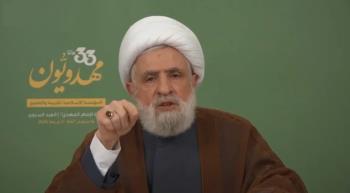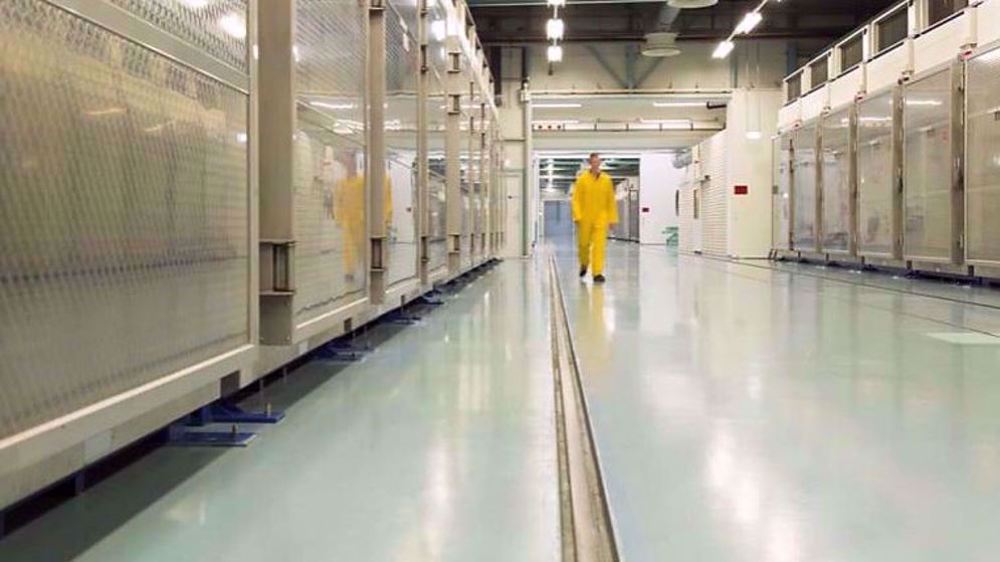Alwaght- Iran has enriched uranium to a purity of 20-percent, using a cascade of advanced centrifuges it launched two weeks ago.
Spokesman for the Atomic Energy Organization of Iran Behrouz Kamalvandi said Sunday this was the final technical stage in the process.
He said Iran had in advance informed the UN nuclear agency of its plan to inject uranium gas into a cluster of IR-6 centrifuges at the Fordow facility.
According to Kamalvandi, the Western media started hyping up the issue, as soon as the the International Atomic Energy Agency verified Iran's enrichment.
On Saturday, Reuters cited an IAEA report, which confirms Iran has increased enrichment, using advanced machines. The news agency once again highlighted West's purported concerns about Iran's nuclear program, despite acknowledging that Iran had indeed informed the agency of its enrichment plan.
Tehran says the Western tactics are only meant to pressure it at the ongoing talks for the removal of sanctions.
Kamalvandi said Sunday Iran informed the UN nuclear agency about injecting uranium hexafluoride gas (UF6) into a cascade of IR6 centrifuges about two weeks ago.
The Reuters report had said that “On 9 July 2022, the Agency verified that Iran had begun feeding UF6 enriched up to 5% U-235 into the cascade of 166 IR-6 centrifuges with modified sub-headers for the declared purpose of producing UF6 enriched up to 20% U-235.”
“The IAEA has been informed about feeding gas into a new cascade of IR6 centrifuges at least two weeks ago and announced this earlier," Kamalvandi said.
But, mainstream media "exaggerated the matter, pursuing certain aims,” he added.
“Iran’s yesterday move in producing 20% output from this cascade was the final technical step of a pre-announced measure,” he said, adding that “what AEOI has done is in line with carrying out its legal duties to launch and feed 1,000 (six cascades) of IR6 centrifuges.”
Tehran’s measures come in response to the unilateral withdrawal of the United States from the JCPOA, officially called the Joint Comprehensive Plan of Action, in 2018. Pulling out Washington from the 2015 deal, then-president Donald Trump imposed severe economic sanctions against Iran in what he called “maximum pressure policy” in a bid to reach a “better deal”.
Iran implemented a one-year “strategic patience” to see if other signatories to the deal can safeguard its economic interests. Seeing no practical measure, Iran started reducing commitments to the JCPOA in May 2019 in clear and pre-announced steps.
The Iranian Parliament also ratified a bill, obliging the government to expand the country’s nuclear activities in response to the violations committed by the American side.
Tehran also says its remedial moves are in conformity with Paragraph 36 of the JCPOA and are reversible if other sides of the agreement adhere to their part of obligations.
Iran and the remaining signatories to the deal started negotiations in April 2021 in the Austrian capital of Vienna, aiming to bring the US back into the JCPOA and remove its unilateral sanctions against the Islamic Republic.
Iran has cited Washington’s indecisiveness as the reason behind the lengthening of talks, as a number of key issues remain unresolved, ranging from the removal of all post-JCPOA sanctions to the provision of guarantees by the American side that it will not leave the deal again.
The efforts have been further complicated by the UN nuclear agency’s politically-motivated decisions, under the pressure of the West and Israel.
Iran and the US attended indirect talks in Doha last week with no tangible result as Tehran stresses that it needs a guarantee for reaping the economic benefits of the deal.
“So our demand is not excessive and we are on the path of acquiring the guarantees. The US should commit that the Islamic Republic of Iran will receive all the benefits of the 2015 deal. This is what the American side has failed to give assurances about its realization,” Iranian Foreign Minister Hossein Amir-Abdollahian said earlier this month in a joint press conference with his Qatari counterpart Mohammed bin Abdulrahman Al Thani in Tehran.



























